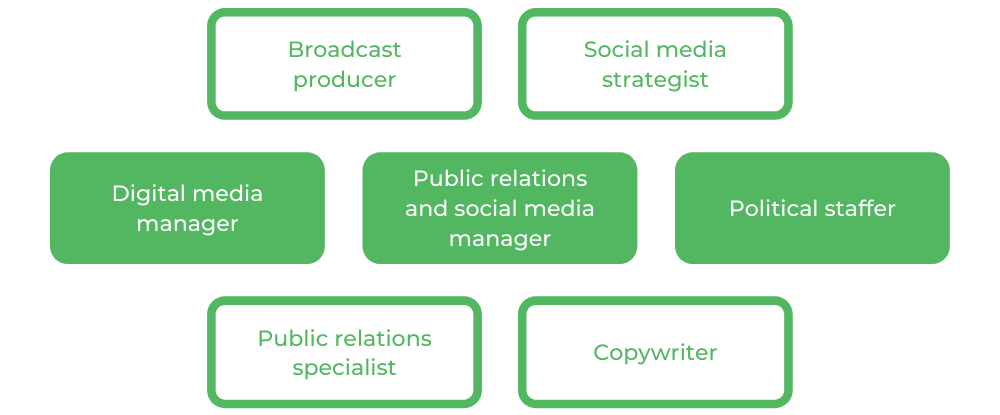Now you’ve got all the facts about what a UQ Communications degree is like, but have you ever wondered what the student experience is really like?
We spoke to Emma from UQ about her experience studying there to discover all the pros and cons of the degree.
Let’s get all the information to help you make the best decision for you!
Why should you study a Communications degree at UQ?
Top 3 Pros of a Communications Degree
Top 3 Cons of a Communications Degree
Mistakes You Shouldn’t Make
Things to Know Before Starting UQ Communications
What Makes this Degree Different
Motivations for Studying UQ Communications
Potential Career Paths
Why should you study a Communications degree at UQ?
A Bachelor of Communications from UQ prepares graduates for an ever changing world of technology and shifting media landscapes. The strong foundational theory and research methods that UQ imparts provide graduates with the ability to adapt and critically evaluate media.
UQ also develops many practical skills like production skills, critical thinking, writing and communication skills. Students are able to explore a range of modes of communication, including emerging media platforms, social media, screen audio and written form.
On top of all this, UQ offers an in-built internship within the Communications degree giving students a chance to gain practical experience before graduating and apply the theory and skill they have learned in university.
Top 3 Pros of a Communications degree
#1: Theoretical foundations
Emma loved the strong theoretical foundations that studying a Bachelor of Communications at UQ provides her with.
Emma also spoke highly of the way UQ taught research methods saying, “You learn how to research really, really well. They are very thorough on research methods but some people might not like that and they might prefer practical stuff. In that case, maybe not UQ as it definitely focuses more on research and theory.”
#2: Depth and range of study
While UQ offers students a wide range of choice when studying Communications, Emma also noted that they are very in-depth with the courses despite their breadth.
“You feel you are fleshing everything out. Whenever you do a course you’re like, I feel like I’m learning so much — even if I don’t really like the course particularly,” she said.
She added, “In Communications, you learn about PR, then you switch to creative writing, research methods, and digital analytics. Despite there being so much that you cover, it’s all in a fair bit of depth.”
#3: Beautiful campus
The campus of UQ is extremely beautiful, filled with green spaces and beautiful architecture located on sprawling grounds. Emma joked, “I like the campus it has good food options!”
Top 3 Cons of a Communications degree
#1: It’s kind of lonely
Due to the wide range of courses offered in Communications at UQ and the flexibility of it, people tend to study certain units at different times and in different orders so you don’t really progress through your degree with a cohort.
Emma said, “I don’t really see the same people over and if I do, we’d only see each other for a semester at a time so it’s hard to build that kind of connection. It’s a little bit lonely because you never see the same people unless you join societies.”
#2: Can be a little snobby
Emma emphasised that it is a really small minority and “most people are lovely, but you do come across people who brag about their ATAR or rich parents.” UQ is the top university in the state and with that comes a bit of prestige.
However, this is only a small minority of people and they are easy to ignore. “We’re all paying the same amount of money,” Emma said about ignoring them and concentrating on her studies instead.
#3: The focus on theory
While the theoretical foundations that UQ provides students with is listed as the first pro, it can also be a con depending on what you are looking for! Emma noted that while you do get to do an internship as part of the degree which gives students practical skills — those who are looking for a more hands on approach to learning may prefer a different university.
Any regrets?
“No, not particularly. Once again, I think UQ is the best place for my degree,” Emma said.
“I started in Arts and Social Science first and I had just gotten out of high school. I was like I’m a uni student, I’m an adult but I just wasn’t mature enough to grapple the topics at hand.
“So when we talked about different systems of politics and social science it was super duper complicated for me at that time, but now that I’m older I’m kind of like, ‘Oh, that’s awesome!’ So sometimes I wonder what would have happened if I stuck to that. But once again, in Communications, I can apply it to social science and I can do whatever I want with it which means I’m not so regretful,” shared Emma.
What do you wish you had known before starting UQ Communications?
Emma wished that she had reached out to more societies and networking events when she was first starting out in university. Due to the flexibility and wide range of courses that a Communications degree offers, it is rare to see peers after the semester has ended.
She further notes that there aren’t as many creative courses as she had initially expected, thus despite really enjoying the theory and research methods that UQ has taught her, it can be a bit of a double-edged sword.
However Emma summed up by saying, “Apart from that, I think I’ve done everything as I would have liked to do it and I’m still happy with how things have played out.”
What makes this degree different from the ones offered at other universities?
“The research methods,” Emma said firmly. “I thought Communications would be like, ‘Okay, write a story, or a press release,’ but you do focus a bit on qualitative and quantitative research methods.”
Thus providing graduates with the ability to analyse and assess which claims and conclusions reported in the media can be trusted, looking at how data can be manipulated to further various agendas.
What inspired you to choose UQ Communications?
Emma chose to study Communications as she recognised it was a practical skill that could be transferred and applied in conjunction with her Arts major of History and Psychology. Additionally, the in-built internship in the degree also helped her to realise how her interest in environmentalism can be combined with her studies.
“I ended up getting an internship with Greenpeace Australia Pacific, so I’m helping them in their communications department. I love it because I want to do environmental communications and it’s pretty much exactly like what I want to be doing,” she highlighted.
UQ’s flexible double degrees also meant that Emma felt that the university was the best choice for her to both pursue her interest in History, but also develop practical skills in Psychology and Communications.
What are the possible career paths?
Graduating with a Bachelor of Communications from UQ offers students a wide range of roles they can step into after graduation in a wide range of sectors, from traditional broadcasting companies to activism or social media marketing. Communications enables you to find a job that combines personal interests with your skills.
Careers include:
- Broadcast Producer
- Social Media Strategist
- Digital Media Manager
- Public Relations and Social Media Manager
- Political Staffer
- Public Relations Specialist
- Copywriter
Check out some other careers you can pursue with a Communications degree here!
Tiffany Fong is currently completing a double degree in Media and Communications with Law at Macquarie University. She currently contributes to the university zine, Grapeshot where she enjoys writing feature articles, commentary on current affairs or whatever weird interest that has taken over her mind during that month. During her spare time, Tiffany enjoys reading, writing, taking care of her plants or cuddling with her two dogs.





